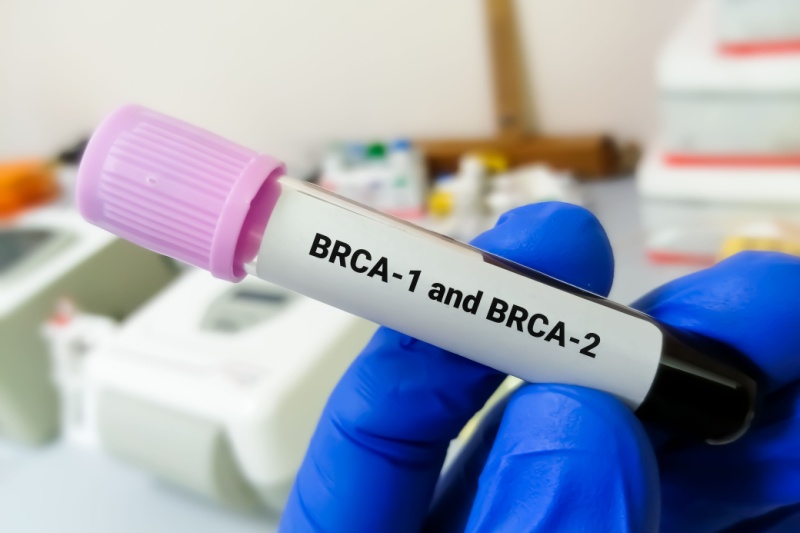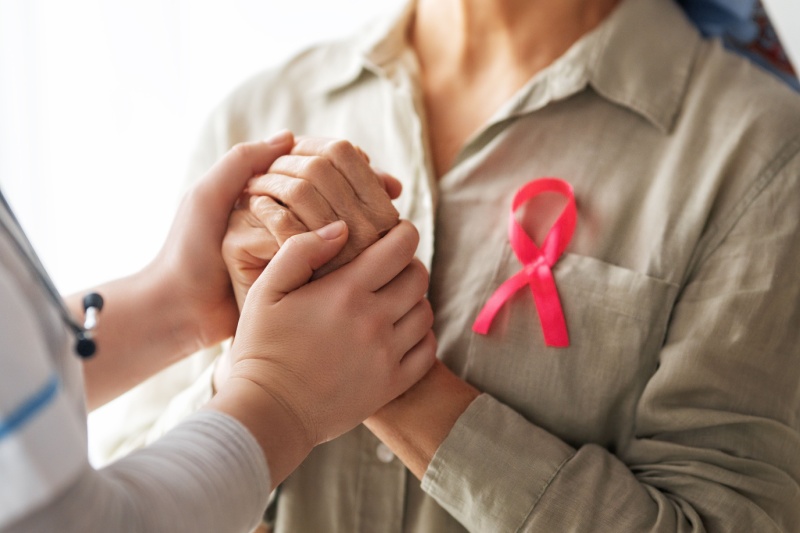Have you ever wondered about the impact of genetics in स्तन कैंसर? The most common cause of hereditary breast cancer is a mutation in the BRCA1 or BRCA2 gene. About 0.25% of the population carry a mutated BRCA1 or BRCA2 gene.
इनके बारे में जानें:
- The role of genetics in breast cancer
- What are BRCA genes?
- BRCA testing
- Prevention and early detection
The role of genetics in breast cancer
Let us explore the role of genetics in breast cancer:
- A small percentage of breast cancers are caused by genetic mutations that are passed down through generations. These mutations can occur in genes like BRCA1 and BRCA2 Having one copy of the altered gene in each cell is enough to increase the risk of developing breast cancer.
- In addition to BRCA1 and BRCA2, other genes associated with an increased risk of breast cancer include PALB2, ATM, CHEK2, CDH1, STK11, PTEN, TP53, and NF1.
- Genetic variation in enzyme activity may be related to breast cancer risk.
- Genetic factors largely determine the complex estrogen regulation, synthesis, transport, and clearance process.
- Other factors that can influence an individual’s risk of developing breast cancer include reproductive history, contraceptive and hormone replacement use, radiation exposure early in life, alcohol consumption and smoking, and physical inactivity.
What are BRCA genes?
BRCA genes (BReast CAncer genes) are tumor suppressor genes that help repair damaged DNA and prevent cancerous cell changes.
BRCA1 and BRCA2

- BRCA1 helps maintain genomic stability and acts as a tumor suppressor. Mutations in this gene are responsible for about 40% of inherited breast cancers and more than 80% of inherited breast and ovarian cancers. When BRCA1 is functioning properly, it prevents uncontrolled cell proliferation, which is a hallmark of cancer.
- BRCA2 is a tumor suppressor gene that helps maintain genome stability. Mutations in this gene are linked to many T-cell lymphomas and chronic lymphocytic leukemias.
Everyone has two copies of each BRCA gene, one inherited from each parent. Inheriting a harmful change, or mutation, in one of these genes increases the risk of developing cancers like breast and अंडाशय का कैंसर. People with a BRCA mutation tend to develop cancer at younger ages than people without the mutation.
BRCA testing
BRCA testing is a blood test that looks for changes in the BRCA1 and BRCA2 genes, which can increase the risk of developing certain cancers such as breast, ovarian, prostate, and pancreatic cancers.
Who should consider BRCA testing?
You should consider BRCA testing if you have:
- A close relative with a known BRCA1 or BRCA2 mutation, or two or more close relatives with breast cancer
- A personal history of breast cancer, especially before the age of 50, or with a personal history of ovarian, fallopian tube, or primary peritoneal cancer
- Ashkenazi Jewish ancestry, or Eastern European Jewish ancestry, and a moderate family history of breast and ovarian cancers
Understanding the test results
Testing for inherited changes in BRCA genes in breast cancer can give the following results:
- A positive test result indicates that a person has a harmful change in BRCA1 or BRCA2 and has an increased risk of developing certain cancers. However, a positive test result cannot tell whether or when the tested individual will develop cancer.
- A negative result can have several meanings. If a close blood relative of the tested person is known to carry a harmful change in BRCA1 or BRCA2 and the laboratory was aware of that variant when performing the testing, it means the tested person did not inherit the harmful change that is present in the family and cannot pass it to their children. However, if the tested person has no personal history of cancer or their family isn’t known to carry a harmful variant, then the negative result does not provide additional information about their risk of cancer beyond what is known about their family history and other risk factors they may have.
- A “variant of uncertain significance,” or VUS result implies a change in BRCA1 or BRCA2 for which there is not enough data available to conclude that it increases cancer risk.
Prevention and early detection
If you have inherited a harmful change in BRCA1 or BRCA2, you have several options for reducing cancer risk. These include enhanced screening, risk-reducing surgery, and taking medication to reduce the risk.
Regular checkups and screenings

Women who have inherited harmful changes in BRCA1 and BRCA2 should start breast cancer screening at younger ages and have screening with magnetic resonance imaging (MRI) in addition to mammography. Men with harmful inherited changes in a BRCA gene should discuss screening options with their healthcare provider.
Lifestyle modifications
Some lifestyle modifications that can help reduce the risk of breast cancer include:
- Maintaining a healthy weight throughout life and regular physical activity, such as walking or jogging.
- Avoiding alcohol and smoking.
- Eating a संतुलित आहार full of fresh fruits and vegetables.
- Breastfeeding, if possible.
- Avoiding certain birth control pills.
- Avoiding hormone therapy for menopause.
- Getting regular breast screenings.
- Managing stress.
Risk-reducing surgery options
Risk-reducing surgery involves removing as much of the tissue where cancer may develop as possible. Women may choose to have both breasts removed (bilateral risk-reducing mastectomy) to reduce their risk of breast cancer. Surgery to remove the ovaries and fallopian tubes (bilateral risk-reducing salpingo-oophorectomy) can help reduce the risk of ovarian cancer and, possibly, breast cancer.
BRCA genes might impact the development of breast cancer. While any type of cancer might seem daunting, prevention and early detection are keys to supporting long-term management and health. Incorporate healthy lifestyle changes to keep cancer at bay and ensure long-term well-being.
Stay tuned to the Activ Living Community. Keep up to date with the latest health tips and trends through expert videos, podcasts, articles, and much more on पोषण, फिटनेस, सचेतन, और लाइफस्टाइल से जुड़ी बीमारियां like Asthma, Blood Pressure, Cholesterol, and Diabetes. Activ Living ke saath sahi sehat ki shuruat ABHI karo.
You may also be interested in the following blogs:
- Family History And Heart Health: All You Need To Know
- Exercise During And After Chemotherapy: Tips For Cancer Patients
Popular Searches
How to lower blood pressure | Fruits good for liver | Unhealthy foods | रागी के लाभ | बेसल मेटाबोलिक रेट | हाई ब्लड प्रेशर के लिए एक्यूप्रेशर पॉइंट्स | Ayurvedic medicine for blood pressure | How to control cholesterol at home | Homeopathy for Asthma | Biological Age | Home remedies for TB | Natural beta blockers | Negative effects of internet | Types of walking | ब्लड प्रेशर कैलकुलेटर | ब्लड शुगर कैलकुलेटर | BMI कैलकुलेटर





 1800-270-7000
1800-270-7000







